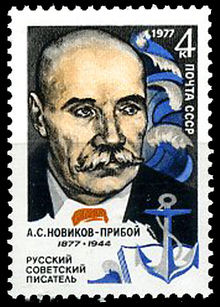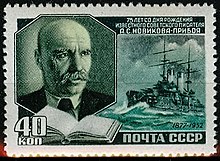131:
267:
39:
213:
by the
Japanese, while in prison camp he began gathering stories from fellow survivors. After the war, he returned to his hometown and began writing, and his first works describing the war in highly critical terms were published in 1906. He soon fell foul of the tsarist authorities however, who
233:, where he lived until 1920 in a commune with fellow writers and artists. His first collection of short stories, Sea Stories, was published in 1917 after some difficulties with the publishers. Novikov-Priboy's early works were influenced by Gorky and are part of the mainstream of Russian
263:, (2nd degree). The novel describes the heroism of Russian sailors and certain officers, the increase in revolutionary activity, and what he considered criminal negligence of the Imperial Russian Naval command.
222:, who provided him with advice on his writing. Novikov-Priboy supported himself working part-time as a blacksmith, accountant, and as a merchant sailor. He returned to Russia in 1913 under a false passport.
177:. His mother, of Polish descent, had hoped that he would enter the church as a monk, but he was attracted to the thought of adventure by hearing stories from travelling sailors, and volunteered for the
349:
Prokhorov, A. M. (Editor). Great Soviet
Encyclopedia (Bol'shaia Sovetskaia Entsiklopediia) (A Translation Of The Third Edition, Volumes 1 thru 31) . Collier Macmillan Publishers (1973) ASIN: B000Q70HJQ
130:
214:
banned his works, and
Novikov-Priboy was forced to go into hiding. He fled to Finland in 1907, and between 1907 and 1913 lived in England, visiting France, Spain, North Africa and
417:
422:
412:
407:
92:
402:
259:, and was able to access government archives. The first part of the book was published in 1932, and the second part was awarded the
462:
299:
366:
427:
442:
17:
185:
from 1899 to 1906. He became involved with revolutionary activities from an early age and after publishing an article in a
38:
457:
193:
of 1904–05, he was soon released, and with his records marked "unreliable" was transferred to the 2nd
Pacific Squadron's
437:
174:
64:
374:
295:
367:
Katerina Clark, Evgeniĭ Aleksandrovich
Dobrenko, « Soviet Culture and Power: A History in Documents, 1917-1953
294:
issued in 1952 and 1977, and numerous streets in the former Soviet Union were named after him. His honors include
447:
452:
432:
197:
312:
178:
189:
newspaper in 1903, was arrested from spreading "subversive propaganda". However, due to the
397:
392:
287:
8:
291:
173:
Novikov-Priboy was the second son of a peasant family from
Matveyevskoye village of the
203:
190:
68:
370:
234:
260:
154:
142:
210:
278:, Novikov-Priboy continued to publish works about the navy. He died in 1944 in
226:
72:
386:
275:
182:
96:
305:
In 1969, his daughter opened a private museum in his honor, at his former
219:
194:
162:
186:
161:; 24 March 1877 – 29 April 1944) was a Russian and Soviet writer and
237:
literature. These include classic "seafaring" works, including (the
238:
230:
225:
During World War I, from 1915 to 1918, Novikov-Priboy worked on
279:
88:
307:
215:
266:
255:
From 1920, Novikov-Priboy began work on a historical epic
418:
Russian military personnel of the Russo-Japanese War
423:
Recipients of the Order of the Red Banner of Labour
333:, Foreign Languages Publishing House, Moscow, 1965.
43:1977 Soviet postage stamp honoring Novikov-Priboy
384:
165:, noted for his stories with a nautical theme.
413:People from Spassky Uyezd (Tambov Governorate)
202:, on which he participated at the climactic
134:Room from Novikov-Priboy's dacha near Moscow
37:
114:Novel, novella, short story, sketch story
408:20th-century Russian short story writers
265:
181:instead. He served as a seaman with the
129:
318:
14:
385:
369: » Yale University Press, 2007,
24:
343:
286:, unfinished. His grave is at the
25:
474:
403:20th-century Russian male writers
327:, Hutchinson International, 1946.
300:Medal "For the Defence of Moscow"
296:Order of the Red Banner of Labour
218:, where he befriended the exiled
290:. Novikov-Priboy was honored by
463:Burials at Novodevichy Cemetery
428:Recipients of the Stalin Prize
360:
270:Novikov-Priboy on a 1952 stamp
13:
1:
353:
229:, and afterwards settling at
139:Aleksey Silych Novikov-Priboy
443:Russian historical novelists
292:commemorative postage stamps
168:
151:Aleksey Silantyevich Novikov
147:Алексей Силыч Новиков-Прибой
52:Aleksey Silantyevich Novikov
7:
159:Алексей Силантьевич Новиков
10:
479:
458:Soviet short story writers
438:Socialist realism writers
158:
146:
118:
110:
102:
78:
48:
36:
29:
339:, Hyperion Press, 1978.
313:Pushkino, Moscow Oblast
282:, with his final novel
63:Village Matveyevskoye,
271:
244:(1919) and the novels
135:
31:Aleksey Novikov-Priboy
269:
179:Imperial Russian Navy
133:
18:Alexey Novikov-Priboy
319:English translations
311:at Cherkizovo, near
288:Novodevichy Cemetery
183:Russian Baltic Fleet
448:Soviet male writers
284:Captain First Class
274:After the start of
242:The Call of the Sea
272:
204:Battle of Tsushima
191:Russo-Japanese War
136:
69:Tambov Governorate
128:
127:
16:(Redirected from
470:
453:Soviet novelists
433:Maritime writers
377:
364:
160:
148:
85:
60:
58:
41:
27:
26:
21:
478:
477:
473:
472:
471:
469:
468:
467:
383:
382:
381:
380:
365:
361:
356:
346:
344:Further reading
331:The Sea Beckons
321:
246:The Submariners
227:hospital trains
211:prisoner of war
171:
87:
83:
62:
56:
54:
53:
44:
32:
23:
22:
15:
12:
11:
5:
476:
466:
465:
460:
455:
450:
445:
440:
435:
430:
425:
420:
415:
410:
405:
400:
395:
379:
378:
358:
357:
355:
352:
351:
350:
345:
342:
341:
340:
334:
328:
320:
317:
250:The Salty Font
170:
167:
126:
125:
120:
116:
115:
112:
108:
107:
104:
100:
99:
86:(aged 67)
80:
76:
75:
73:Russian Empire
50:
46:
45:
42:
34:
33:
30:
9:
6:
4:
3:
2:
475:
464:
461:
459:
456:
454:
451:
449:
446:
444:
441:
439:
436:
434:
431:
429:
426:
424:
421:
419:
416:
414:
411:
409:
406:
404:
401:
399:
396:
394:
391:
390:
388:
376:
375:9780300106466
372:
368:
363:
359:
348:
347:
338:
335:
332:
329:
326:
323:
322:
316:
314:
310:
309:
303:
301:
297:
293:
289:
285:
281:
277:
268:
264:
262:
258:
253:
251:
247:
243:
240:
236:
232:
228:
223:
221:
217:
212:
207:
205:
201:
200:
196:
192:
188:
184:
180:
176:
175:Spassky Uyezd
166:
164:
163:marine artist
156:
152:
144:
140:
132:
124:
121:
119:Notable works
117:
113:
109:
105:
101:
98:
94:
90:
82:29 April 1944
81:
77:
74:
70:
66:
65:Spassky Uyezd
61:24 March 1877
51:
47:
40:
35:
28:
19:
362:
336:
330:
324:
306:
304:
283:
276:World War II
273:
261:Stalin Prize
256:
254:
249:
245:
241:
224:
208:
198:
172:
150:
149:; real name
138:
137:
122:
97:Soviet Union
84:(1944-04-29)
398:1944 deaths
393:1877 births
325:The Captain
248:(1923) and
220:Maxim Gorky
209:Taken as a
387:Categories
354:References
195:battleship
103:Occupation
57:1877-03-24
235:realistic
187:Kronstadt
169:Biography
337:Tsushima
257:Tsushima
252:(1929).
123:Tsushima
239:novella
231:Barnaul
155:Russian
143:Russian
373:
280:Moscow
106:Writer
89:Moscow
308:dacha
216:Capri
199:Oryol
111:Genre
93:RSFSR
371:ISBN
298:and
79:Died
49:Born
389::
315:.
302:.
206:.
157::
153:,
145::
95:,
91:,
71:,
67:,
141:(
59:)
55:(
20:)
Text is available under the Creative Commons Attribution-ShareAlike License. Additional terms may apply.


